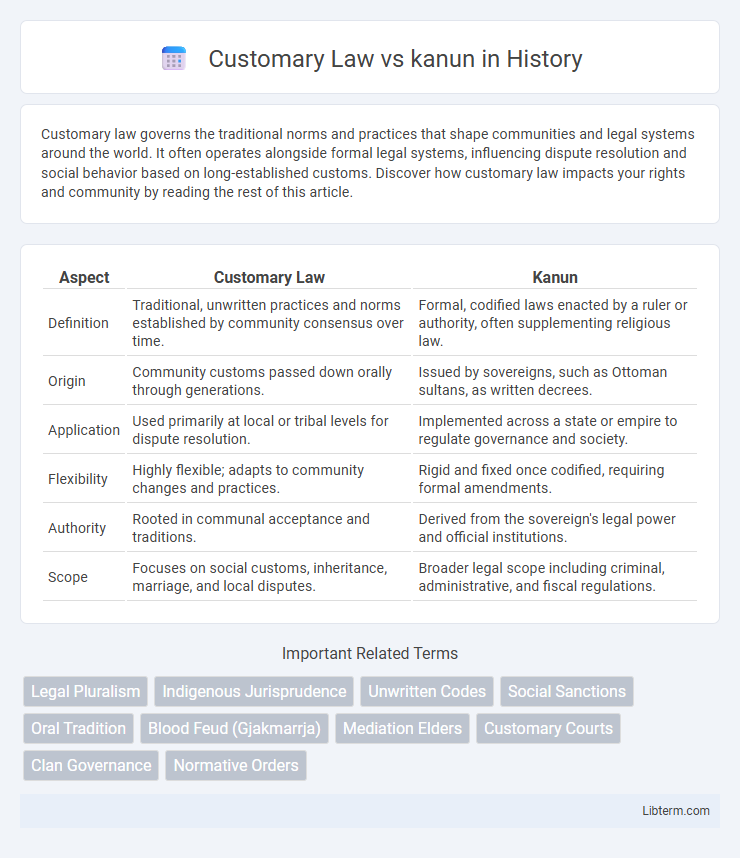Customary law governs the traditional norms and practices that shape communities and legal systems around the world. It often operates alongside formal legal systems, influencing dispute resolution and social behavior based on long-established customs. Discover how customary law impacts your rights and community by reading the rest of this article.
Table of Comparison
| Aspect | Customary Law | Kanun |
|---|---|---|
| Definition | Traditional, unwritten practices and norms established by community consensus over time. | Formal, codified laws enacted by a ruler or authority, often supplementing religious law. |
| Origin | Community customs passed down orally through generations. | Issued by sovereigns, such as Ottoman sultans, as written decrees. |
| Application | Used primarily at local or tribal levels for dispute resolution. | Implemented across a state or empire to regulate governance and society. |
| Flexibility | Highly flexible; adapts to community changes and practices. | Rigid and fixed once codified, requiring formal amendments. |
| Authority | Rooted in communal acceptance and traditions. | Derived from the sovereign's legal power and official institutions. |
| Scope | Focuses on social customs, inheritance, marriage, and local disputes. | Broader legal scope including criminal, administrative, and fiscal regulations. |
Introduction to Customary Law and Kanun
Customary Law refers to traditional legal practices and norms rooted in the customs and cultures of specific communities, often unwritten and passed down through generations. Kanun, particularly known in Ottoman and Balkan contexts, is a codified system of laws that formalizes these customs into written statutes. Both serve as foundational legal frameworks, with Customary Law emphasizing community consensus and historical continuity, while Kanun represents a structured, centralized approach to governance and justice.
Historical Origins of Customary Law
Customary law originates from ancient societal practices and unwritten norms passed down through generations, predating formal codified legal systems like the kanun. Unlike the kanun, which is a structured set of written laws typically established by rulers or governments, customary law reflects the collective customs and traditions of specific communities. Historical origins of customary law are deeply rooted in tribal, indigenous, and local societal governance, influencing dispute resolution and social conduct long before the codification of kanun-based legislation.
The Evolution of Kanun in the Balkans
The evolution of Kanun in the Balkans reflects a complex interplay between customary law and codified legal systems, with the Kanun serving as a foundational set of traditional laws primarily among Albanian communities. Unlike customary law, which is orally transmitted and varies regionally, Kanun was systematically documented, most notably through the Kanun of Leke Dukagjini in the 15th century, formalizing social norms, property rights, and dispute resolution practices. Over centuries, Kanun adapted to changing political and social landscapes, influencing and sometimes clashing with Ottoman legal frameworks and modern national laws in the region.
Key Principles of Customary Law
Customary law is based on long-established community practices and unwritten norms that govern social behavior, emphasizing consensus, continuity, and communal acceptance. Key principles include respect for tradition, collective responsibility, and flexibility to adapt to local customs and changing circumstances. Unlike kanun, which is a codified legal system enacted by authoritative rule, customary law relies on oral transmission and informal enforcement mechanisms.
Distinctive Features of Kanun
Kanun, as a codified legal system, features comprehensive regulations that address social, economic, and administrative matters with precise statutes, unlike the flexible, orally transmitted principles of customary law. Its distinctive characteristic includes formal documentation and state authority endorsement, ensuring uniform application and legal certainty. Kanun's structural codification contrasts with customary law's adaptive nature, promoting predictability and centralized governance in legal processes.
Social Functions and Roles
Customary law governs social behavior by reflecting the traditions and values of a community, thereby fostering social cohesion and stability through informal dispute resolution mechanisms. Kanun, codified and structured, serves as a formal legal framework that organizes social roles and relationships, particularly in regulating property rights, family matters, and honor-related issues. Both systems function to maintain order and social harmony, but customary law operates through consensus and communal norms, while kanun enforces rules via prescribed legal procedures.
Comparative Legal Practices
Customary law evolves from long-standing traditions and social practices within specific communities, emphasizing communal norms and informal dispute resolution mechanisms. Kanun represents codified legal systems, such as the Ottoman Kanun, which formalize rules and state authority in written statutes, offering uniformity and predictability. Comparative legal practices reveal how customary law provides flexibility and cultural relevance, whereas kanun ensures standardized governance and legal certainty across larger jurisdictions.
Conflict Resolution Mechanisms
Customary law relies on community-based, traditional practices and elders to resolve conflicts through mediation and consensus, emphasizing social harmony and restoration. In contrast, Kanun, a codified legal framework historically prominent in Balkan regions, prescribes detailed rules and penalties, often prioritizing retributive justice. The conflict resolution mechanisms under customary law are flexible and adaptive to local contexts, whereas Kanun enforces rigid procedures and formalized punishments.
Challenges of Integration with Modern Law
The integration of customary law with kanun faces challenges such as conflicting principles, as customary law is based on local traditions and social norms, while kanun reflects codified state legislation. Differences in enforcement mechanisms and legal interpretations create difficulties in harmonizing both legal systems within modern judicial frameworks. Inconsistencies lead to legal uncertainty, complicating dispute resolution and hindering effective governance.
Future Perspectives of Customary Law and Kanun
Customary law, deeply rooted in cultural traditions and community practices, is increasingly being integrated with formal legal systems to enhance local governance and dispute resolution. Kanun, as a codified legal framework, continues to evolve by adapting to contemporary social and political changes while preserving historical legal principles. Future perspectives suggest a synergistic coexistence where customary law complements kanun, promoting legal pluralism and responsive justice systems in diverse societies.
Customary Law Infographic

 libterm.com
libterm.com